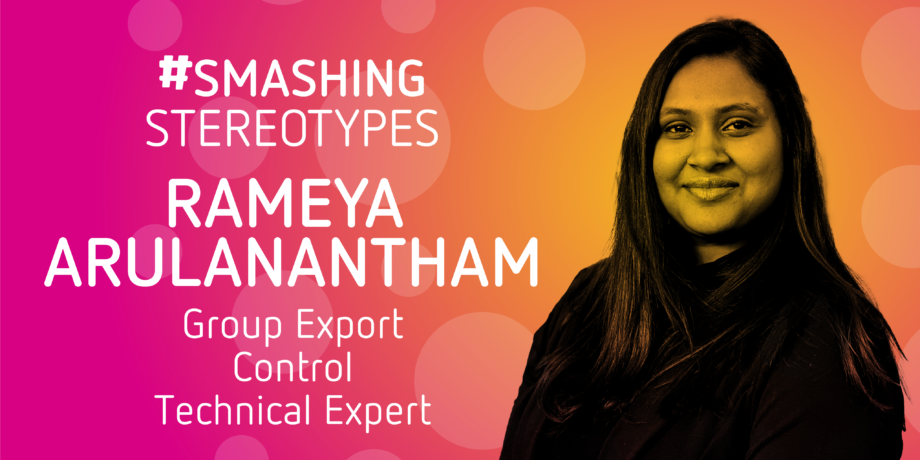
Rameya Arulanantham
Group Export Control Technical Expert, Urenco
Ensuring export control compliance in a nuclear environment
Rameya Arulanantham is Group Export Control Technical Expert at Urenco, an international supplier of fuel cycle products for the nuclear power industry. Based at the company’s head office, she ensures compliance and acts as the primary source of guidance in relation to technical export control matters to the company’s scientists and engineers at its sites in the UK, Germany, Netherlands and US.
Exploring science’s practical side
My interest in science began in secondary school. I loved the practical side of it. One of my first memories of science at school was the chemistry teacher doing an experiment where they placed a small piece of sodium and potassium in water, and it was a ‘wow’ moment. I was amazed by the reaction and I thought: ‘This is what chemistry is!’ I was fascinated.
I really enjoyed science throughout school and did GCSE and A Levels, but deciding what to do for university was a real struggle. Then I did a taster day at Royal Holloway University, and it was eye opening. I really enjoyed the practical side, so that’s when I decided to focus on chemistry.
I studied for a degree in chemistry with business management at Queen Mary’s University. The mornings were taken up with lectures and then the afternoons were mostly lab-based. It was a lot of work and quite intense from a learning point of view studying two subjects, but I really enjoyed it because it gave me a business economics background as well, which I think is useful when you’re working in industry.
From chemistry enthusiast to forensic scientist
After my undergraduate degree, I moved on to a master’s in forensic science at King’s College, London.
I was really interested in the criminal side of forensics and actually got to work with the Met Police as part of the forensic science programme, exploring what scientific evidence you could get from fingerprints.
Typically, forensic careers in the UK are specialised – you’d focus on DNA or toxicology for example. I was tempted by a career as a forensic scientist, but I wasn’t sure which area I wanted to specialise in and worried that my horizons could become quite limited.
Fortunately, I secured a graduate job as an analytical scientist in radiochemistry, which meant that I used chemistry to study radioactive substances. The role allowed me to use the full range of forensic skills I’d learned; I did some DNA analysis, some microscopy, as well as chemical analysis. The breadth of techniques we used suited me really well.
Towards the end of my time working in radiochemistry I branched out into capability management, which means I was overseeing the resources we used and teams of people. In that role, I went to scientific conferences, presented to colleagues and trained them. It was really varied and even involved going on military exercises as a scientific evidence expert. One day I’d be in the lab, another day I’d be out gathering evidence samples. It was great being able to utilise a whole range of forensic, scientific and management techniques.

Broadening my expertise
A chemistry degree allows you to pursue many different careers. I then moved into a job as a technical adviser at the Department of Business and Trade.
There I was part of a team of scientists and engineers who all came with their niche industry experiences. I very quickly learned about the other areas of science and technology, gaining expertise in UK export controls, facilitating responsible exports by regulating the export of sensitive technologies. I was a chemist in the nuclear area, but was able to learn about biologicals (products derived from living things, like vaccines), about military items and a vast range of IT and cryptography technology. It was really interesting to be able to learn again. I really enjoyed my time there.
After almost eight years working in government, I moved into my current role as a technical expert at Urenco last year. It is a really good fit for me because I can use and build on my knowledge and expertise from my previous roles.
I love the ethos here and I’m really excited to be in a company that is working towards Net Zero by playing an essential role in the generation of reliable low carbon electricity . The company also works on medical isotopes and that’s really interesting too, because it plays an important role in cutting edge cancer diagnosis technologies.
The scientific method
I think one of the great things about being a scientist is that you’re constantly learning. I’m not in the lab anymore, but I am exposed to technical information and visit the plants where we enrich uranium. Every day is different, and my job is really about problem solving. So, it’s no longer just about doing the kind of chemistry experiments that I wanted to do in the past, but also looking at a problem and thinking, ‘How do we fix this?’
Studying science really opens so many possibilities. You may study a typical scientific discipline, but you can move into any career. I have friends from university who studied science but are now accountants or project managers. The key skills you learn as a scientist equip you for many different roles.
I think scientists also bring an evidence-based approach to problem solving, which make things clearer as you have a way of thinking that can help solve complex problems.
Thriving as a trailblazer in a male-dominated industry
The defence and security industry are very male dominated. There aren’t many women that do this role, and there certainly aren’t many British Asian women.
Throughout my career, I’ve routinely worked in teams where there’s only been one or two women.
Everyone has been really accommodating and good at making me feel included, but I’m acutely aware that there weren’t, and aren’t, many other women in my role. That needs to change.
The power of mentorship
Mentors can play an important role. I had a mentor in my first graduate job who was really instrumental in helping me towards becoming a chartered chemist and opening me up to other areas of science and the key skills I needed to develop. Having a female mentor who I could look up to was so important.
Since then, I’ve also been a mentor. I’ve been a STEM Ambassador for quite a few years and I also work with the Royal Society of Chemistry, helping new chemists just starting out in their careers.
I’d like anyone considering a career in science to know that it is not just for one type of person.
Science is for everyone.
This profile was last updated on 15 March 2024.